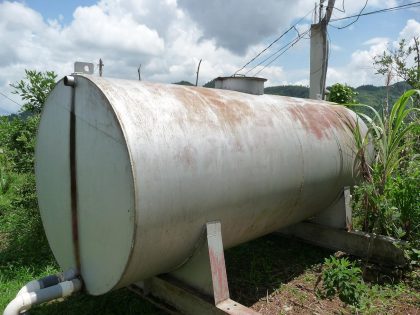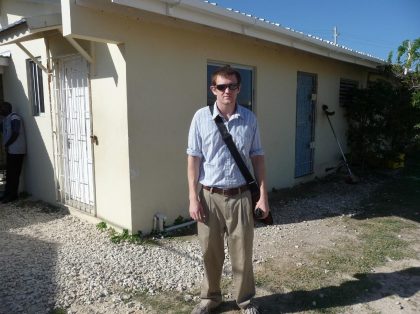 Location
Location
Stettin, Trelawny, Jamaica
Community Description
Stettin is a small community just outside of Albert Town, Trelawny. Albert Town is the major destination in Southern Trelawny for shopping, services, and transportation.
The southern half of Trelawny consists mostly of subsistence farmers who support their families on what they grow. They produce crops to sell at markets, both local and in the nearby population centers of Christiana, Mandeville, and Falmouth. Southern Trelawny is best known for growing yam, but many other crops, such as cabbage, banana, potato, tomato, peppers, and more are grown in the region.
Project Description
This project will provide the infrastructure, equipment, and training necessary to treat and make safe the water used at the Stettin Health Center.
Currently, the center gets its water from a rainwater catchment system. The water is then used without treatment, which puts users at risk of water-borne illness. By adding chlorine when needed, in the right proportion, the risk can be greatly reduced.
 Project funds will be used to purchase three residual chlorine testers. One tester will be used at the clinic, for testing during day-to-day treatment. The second tester will be used by the Trelawny Water Quality Inspector to independently verify that the treatment of the water at the health center is being performed correctly. The third tester will be kept as a spare so that treatment could continue if one tester were lost or broken.
Project funds will be used to purchase three residual chlorine testers. One tester will be used at the clinic, for testing during day-to-day treatment. The second tester will be used by the Trelawny Water Quality Inspector to independently verify that the treatment of the water at the health center is being performed correctly. The third tester will be kept as a spare so that treatment could continue if one tester were lost or broken.
In addition, plumbing materials to ready the system for proper water testing and adding chorine will be purchased.
Finally, operators at the center will be trained to test the water and add chlorine on a daily basis.
Project Impact
The Stettin health center is the only public medical facility in the Stettin/Albert Town area. The number of people in the center’s area of service is estimated to be about 17,800. The number of people impacted in a given year will be several thousand.
The population that uses the health center consists of a high percentage of sick, elderly, infants, and pregnant mothers, all of whom are high-risk groups for water-borne illness.
Peace Corps Volunteer Directing Project
Jerome Drescher
Comments
This project will result in the testing of potable water at a heavily utilized public clinic and treating it to make it safe. A very small amount of money will have a drastic impact in the reduction of disease. It fits precisely within the Appropriate Projects guidelines due to its critical high-impact intervention.
Dollar Amount of Project
$388.01
Donations Collected to Date
$388.01
Dollar Amount Needed
$0.00 – This project has been fully funded through the generosity of Jerry and Melissa Usrey, Lake Arrowhead, California, USA.
This project was determined to be technically infeasible by Peace Corps Volunteer Jerome Drescher. The community decided to abandon the project. No funds from Appropriate Projects were spent.
The donors, Jerry and Melissa Usrey decided that they wished to direct their contribution to the Ferro-Cement Tanks for the Dominican Republic and Haiti Program, and this has been accomplished.